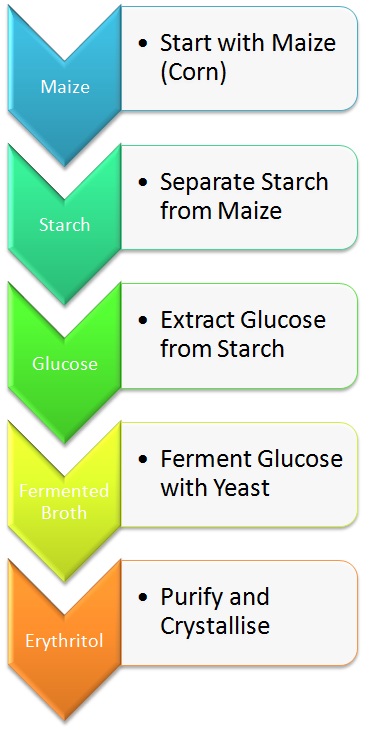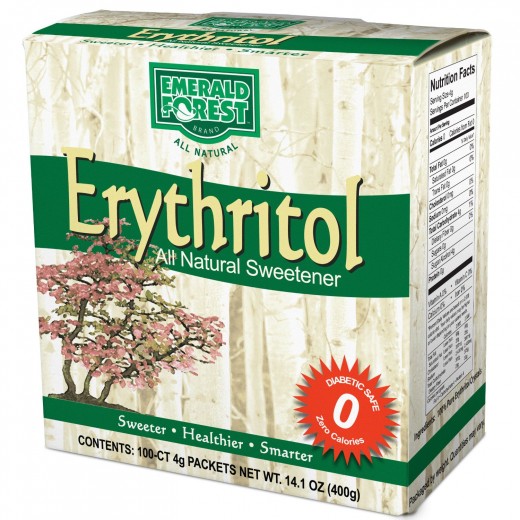Sweeteners: What is Erythritol: Where Can You Buy Erythritol

What is Erythritol?
Erythritol is a naturally occurring sugar alcohol or polyol that is used as a substitute for granulated sugar (sucrose). It naturally occurs in small quantities in certain fruits and fermented foods such as mushrooms and grapes and wine and soy sauce. It has even been found in our body tissues and fluids.
It was discovered in 1848 by a British chemist called John Stenhouse but it was not until 1990 more than 140 years later that commercial production of erythritol was commenced. It does not have the same degree of sweetness of ordinary sugar being somewhere in the range of 60% to 80% of the sweetness of sugar.
Commercially produced erythritol is a white crystalline powder and unlike ordinary sugar it does not attract moisture or to use the technical term it is non-hygroscopic. It is however the most expensive of all the polyols to produce.
Erythritol Extraction Process

Erythritol is Not An Artificial Sweetener
Erythritol or any of the other sugar alcohols such as xylitol, malitol and sorbitol should not be confused with artificial sweeteners. As you would no doubt expect the structure of a sugar alcohol part resembles sugar and part resembles alcohol but they are not alcoholic as they do not contain ethanol.
What is Erythritol Made From?
The diagram to the right shows the various stages in the process that makes erythritol. The glucose is extracted from the maize starch using enzymes. This glucose is then fermented with yeast. This fermented mixture is first heated and then dried to form crystals. These crystals are purified to make them safe for consumption.
What Advantages Does Erythritol Have Over Sugar?
People uses erythritol as a substitute for sugar for four main reasons:
- Erythritol has less calories. In many countries the caloric count is so low that it can be advertised as having zero calories. It actually contains 0.2 calories per gram which is 95% less than sugar. This makes it very attractive to anyone wanting to lose weight.
- Erythritol does not cause tooth decay. It is not broken down in the mouth by oral bacteria to produce the acid which can cause the loss of enamel and the formation of cavities. The FDA actually allows all polyols to claim that they do not promote tooth decay.
- Erythritol has a low Glycemic Index (GI). In tests it has been shown that erythritol does not raise blood sugar or insulin levels and this makes it safe for use by diabetics.
- Erythritol may not feed candida. Some people who are prone to candida find that they can tolerate erythritol without it aggravating this fungal infection in the same way as other sugars.
Erythritol Structure
Molecular Structure - C4H10O4
Formula - HOCH2[CH(OH)]2CH2OH
Erythritol - A Four Carbon Sugar

What Disadvantages Does Erythritol Have Over Sugar?
Erythritol does have some disadvantages
- It is more expensive to produce.
- It has a strong cooling effect when dissolved in water which can be distracting from the eating or drinking experience.
- In large doses it can cause minor side effects.
- As it does not attract water, that is, it is non-hygroscopic this can cause some baked goods to dry out.
- It does not dissolve as well as sugar in water.
It help overcome these disadvantages erythritol is often combined with other materials. Inulin is used to overcome the non-hygroscopic nature whilst other high intensity sweeteners such as stevia are added to increase the sweetness.
Buy Erythritol at Amazon.com
Is Erythritol Safe? Does Erythritol Have Any Dangers or Side Effects?
- Erythritol has been given GRAS status by the FDA which stands for generally recognized as safe and it has been approved for food use in over fifty countries including the European Union, Canada, Australia and Mexico.
-
JECFA, the WHO/FAO Joint Expert Committee on Food Additives gave erythritol the highest safety category possible when it reviewed the safety of erythritol in 1999.
- Unlike some artificial sweeteners, studies have shown that erythritol, like xylitol, does not have cancer causing properties.
- Erythritol is also an antioxidant so it has the ability to fight free radicals.
- Erythritol is the most easily digested polyol and this is because over 90% of erythritol is absorbed in the small intestine and disposed of in the urine. This means that only small amounts reach the large intestine where other polyols have laxative effects and cause diarrhea.
- Large doses in excess of 50g can cause nausea and borborygmi (a rumbling or gurgling noise from the intestines).

Where Can You Buy Erythritol?
Because it is so often combined with other products it is not that easy to find pure erythritol in a shop but it can be easily found online. There are several different makes available from Amazon.com as the capsule above shows. However there are many other different online suppliers to chose from. The easiest way to buy erythritol online is to simply search on the term "buy erythritol".








